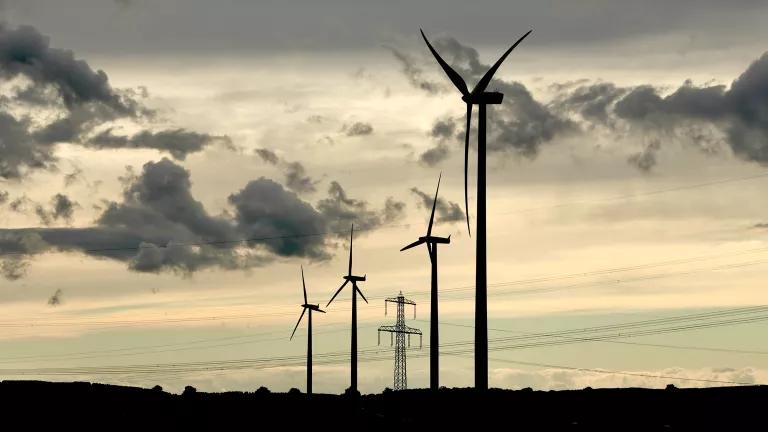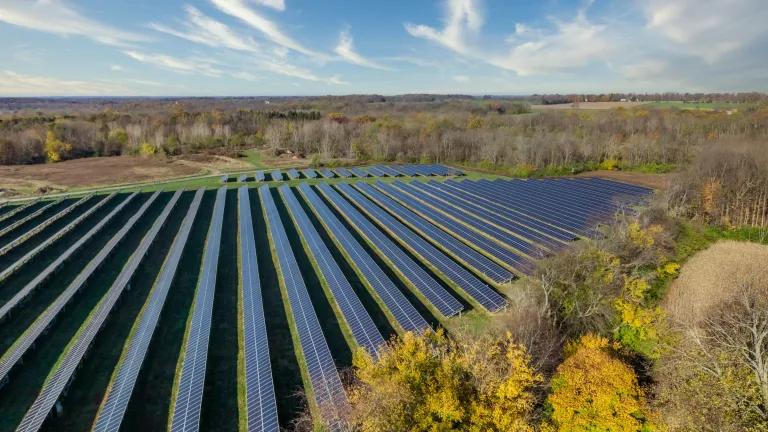Missouri Must Modernize Law to Boost Clean Energy Economy

Source: Clean Line Energy Partners
This post, authored by Rachel Fakhry, originally appeared as a guest post in Starla Yeh's blog.
The Missouri Public Service Commission (MPSC) has voted down a project that would have created jobs, lowered utility bills and protected clean air for Missourians. Nearly seventy towns and cities in the Show-Me state supported the Grain Belt Express transmission project, together with businesses, manufacturers, the environmental community, and others. Yet, for the second time in over two years, the MPSC denied a proposal to build this important transmission line.
The decision denies Missouri the opportunity to capitalize on large economic and environmental benefits. But, it’s not too late for state lawmakers to see this project through and help attract energy infrastructure investments.
What is the Grain Belt Express?
The Grain Belt Express Clean Line is a proposed interstate transmission line that would carry 4,000 megawatts (MW) of cheap wind energy- enough to power 1.6 million homes- from western Kansas to Missouri, Illinois, Indiana, and highly populated areas farther east (figure below). Clean Line Energy Partners, the project’s developer, expects the line to create more than 5,000 jobs over the construction period, unlock nearly $7 billion in investments in wind projects that could not otherwise be built, and cut carbon dioxide pollution by 10 million tons a year across the region. Of the four states that the line crosses, Missouri is the only one to withhold approval.
Grain Belt would deliver large benefits to Missourians and enjoyed broad support.
Grain Belt would reduce Missourians’ energy bills by delivering 500 MW of the 4,000 MW of low-cost, reliable wind energy from Kansas to the Show-Me state, create good-paying jobs, and generate tax revenue that would benefit municipalities and schools. The project would also deliver significant environmental and health benefits, as the clean wind energy would supplant dirty fossil-fueled electricity. Some of the benefits Missourians would expect to reap from the project’s implementation include:
- Lower utility bills, as Grain Belt would deliver cheap wind energy to Missouri towns and cities. Considering that energy bills in Missouri increased at the fourth highest rate in the country in the past ten years, tapping into a reliable, cheap electricity resource sheltered from price fluctuations would be particularly beneficial.
- $10 million a year in savings on energy bills for the residents of the 70 or so cities who had signed up for this deal.
- More than 1,500 jobs created during the three years of construction and dozens of permanent jobs after completion. The state GDP would also increase by more than $450 million over the construction period.
- A $7 million increase in property tax revenues for impacted counties in the first year of operation alone.
- $15 million in easement payments for farmers and landowners along the proposed project route in first year of operation alone, and more than $1 million each year thereafter.
Businesses and manufacturers also demonstrated support for the project. In fact, large corporations in Missouri have been increasingly vocal about their desire to power their operations with clean energy to meet their sustainability goals. There is evidence that Walmart, the Missouri Industrial Energy Consumers, and the Missouri Retailers Association were interested in tapping into the wind energy delivered by the project.
Additionally, Grain Belt enjoyed support from four out of the five Commissioners—the very Commissioners who denied its approval (more on that below). After the Commission denied the request to build the line, MPSC Chairman Daniel Hall said, “There was evidence presented that those ratepayers in those cities [that had contracted to purchase the Grain Belt wind energy] were going to see significant savings to their electric bills if this line was allowed to proceed. […] To me, this project would facilitate that worldwide trend that we’re seeing in renewables, in this region and in Missouri, and for that reason it was in the public interest to approve the line.”
So why vote deny the line?
Foiled by a 1907 law.
MPSC was following a troubling legal precedent. Last year, another proposed project called the Mark Twain line—an interstate transmission line that would transport wind energy from Iowa to Northeast Missouri—was blocked because of a statute in the Missouri energy law dating back to 1907. In simple terms, the statute requires that infrastructure projects get the approval of every county where the projects crosses into, in the form of permits that ensure road safety requirements are met. In other words, the statute effectively puts the fate of critical and beneficial state and regional-wide electricity transmission projects in the hands of county commissioners, instead of the state Public Service Commission that is tasked with ensuring and serving the public interest. In the Grain Belt case, crossing permits are being denied to serve as a pretext for blocking the line, on the false premise that they violate public road safety.
A remedy is needed to fix this legal problem thwarting a clean energy future. Energy infrastructure is needed, and customers are increasingly demanding access to cost-effective renewable energy. This obsolete law deters investors and project developers and jeopardizes infrastructure investments and their accompanying economic benefits in Missouri. As the president of Clean Line Energy asserted after the decision: “The PSC’s decision to deny approval of the project sends a clear message that investors contemplating new infrastructure projects should not come to Missouri.”
Missouri should remove the barriers to capitalize on its unique geographic position.
Missouri lawmakers should remove this barrier to constructing critical infrastructure projects. The requirements of the old-fashioned statute fail to serve the public interest and restrict the Commission on a matter that should fall squarely in its jurisdiction. And they should do so fast, as the current conditions are giving an unfortunate signal to investors and developers to stay away. While Clean Line Partners is still interested in developing the line, utilities and investors could hesitate to commit to the project with further delays. Additionally, Missouri risks underperforming the other states in the region on clean energy progress, as more and more of its neighbors make impressive headway on cost-effective renewable energy investments.
Grain Belt not only promises substantial economic, environmental, and public health benefits to Missouri and the region, but would also serve as a bridge to our energy future. In fact, demand for clean energy is rapidly increasing, as wind and solar technology costs are plummeting and more and more cities and businesses are requesting renewable power. Missouri is uniquely positioned to serve as a gateway between the wind-rich Plains and demand centers of the East. State lawmakers must work to lift barriers and create favorable conditions for clean energy and infrastructure investments, enabling Missouri to capitalize on the clean energy revolution showing no signs of stopping.




